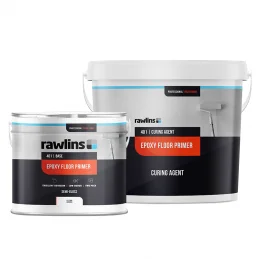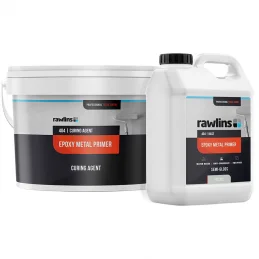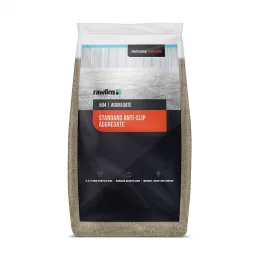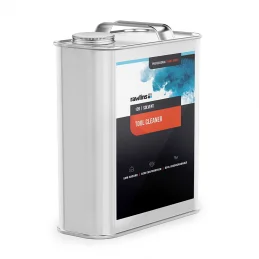- There are no more items in your cart
- Shipping Calculated at checkout
-
Sub-Total (inc. VAT)
£0.00
Rapid curing, two pack, solvent free epoxy coating with outstanding resistance to aggressive acids, solvents and alcohols.
- Excellent adhesion to concrete and steel.
- Excellent chemical resistance to aggressive acids such as 96-99% Sulphuric Acid, Methyl Ethyl Ketone and Methanol.
- Tough, durable and abrasion resistant.
- Very rapid cure, even at low temperatures.
- Hygienic and easily cleaned.
- Slip resistant options.
Important!
- Images are for illustrative purposes only and may differ from the actual product.
- This product is for Professional Use Only.
- Also available in 4000+ shades from RAL, BS and NCS.
- See 310 Chemical Resistant Coating - Special Colours.
Product customisation
Don't forget to save your customization to be able to add to cart310 Chemical Resistant Coating is a rapid curing, two pack, solvent free epoxy coating with outstanding resistance to aggressive acids, solvents and alcohols, e.g. 96-99% Sulphuric Acid, Methyl Ethyl Ketone and Methanol.
Recommended for use as an internal lining for concrete or steel storage tanks; chemical bunds, chemical resistant floor/wall coating for chemical and printing works, bottling and canning factories, pharmaceutical production, water treatment works, oil refineries, etc.
This product is for Professional Use Only.
Quick Links - Click To Jump To Section:
- Features & Benefits
- Typical Properties
- Coverage
- Surface Preparation
- Application
- Cleaning
- Curing
- Limitations
- Storage & Shelf Life
- Health & Safety
Features & Benefits
- Two-pack
- Solvent free
- Rapid curing
- Outstanding resistance to aggressive acids, solvents and alcohols
- Excellent adhesion to concrete and steel
- Tough, durable and abrasion resistant
- Very rapid cure, even at low temperatures
- Hygienic and easily cleaned
- Slip resistant options
Typical Properties
| Technical Data | |
|---|---|
| 310 Chemical Resistant Coating | |
| Pot life @ 20°C: | 30 Minutes |
| Pot life @ 10°C: | 60 Minutes |
| Tack free time @ 20°C: | 3 hours |
| Hard dry time@ 20°C: | 6 hours |
| Full chemical resistance @ 20°C: | 5 days |
| Adhesive strength to concrete: | 4.4MPa (concrete failure) |
| Adhesion strength to Sa 2.5 steel: | 14 MPa |
| Temperature range during application: | 2°C to 30°C |
| Temperature range in service: | -20°C to 70°C |
Chemical Resistance Guide:
Please consult our Technical Department on 0113 2455450 (option 2) or send a message to [email protected] for specific advice.
Coverage
- 0.25-0.30kg/m²/coat
- A 5kg pack is sufficient to treat 8.3m2 of surface with the recommended two coat treatment, providing an overall d.f.t. of 500 microns
Surface Preparation
Concrete:
- Concrete shall be a minimum of 21 days old and/or the residual moisture content shall be below 6%
- Ensure that the concrete is clean and free from dust, laitance, grease, oil, curing compound and existing paint finishes etc
Steel:
- Steel surfaces shall be shot blasted or grit blasted to a nominal Sa 2.5 Swedish standard
- All dust and grease shall be removed prior to coating application
Priming:
- A coat of 401 Epoxy Floor Primer is recommended on absorbent concrete surfaces
- Apply in accordance with 401 Epoxy Floor Primer data sheet
- For steel substrates 310 Chemical Resistant Coating may be applied directly, or if a delay is likely to occur between blasting and application then it is recommended that a coat of 404 Epoxy Metal Primer is applied as a holding primer to obviate flash rusting
Mixing:
- Pour the contents of the curing agent container into the base container and thoroughly mix, preferably by mechanical means, until a uniform colour is achieved
Mixing Ratio:
- By Volume = 2.46 Base : 1 Curing Agent
- By Weight = 100 Base : 35.1 Curing Agent
Application
- Apply by brush or roller at a nominal rate of 0.3kg/m² per coat, with a minimum of 12 hours between coats
- After a minimum of 6 hours @ 20°C but within a maximum of 24 hours, apply a second coat at the same nominal rate
- If the maximum overcoating limit is exceeded, the first coat must be abraded and solvent wiped prior to application of the second coat
- Should a non-slip finish be required, then a broadcast of 504 Standard Anti-Slip Aggregate shall be made immediately after the first coat
- Brush off excess aggregate prior to application of the second coat
Cleaning
- Clean equipment with 109 Tool Cleaner prior to curing of the coating
Curing 
- Allow to cure for a minimum of 6 hours @ 20°C prior to light foot traffic access and 24 hours @ 20° prior to vehicular trafficking
- Allow a minimum of 5 days cure @ 20°C for optimum chemical resistance
Limitations
- Do not apply to wet or uncured concrete surfaces
- Do not apply at temperatures of 2°C or less
- Discoloration/bleaching of the coating can occur on contact with certain aggressive chemicals, thus leading to contamination/discolouration of the chemical itself
- Discoloration is purely a surface effect that does not detract from the efficacy of the coating in service
Storage & Shelf Life
- Store in dry conditions, out of direct sunlight, at temperatures between 10°C and 25°C
- Do not expose to freezing conditions
- 310 Chemical Resistant Coating has a minimum shelf life of 12 months when stored in original, unopened containers in accordance with manufacturer’s instructions
Health & Safety
- Avoid contact of the material with skin and eyes
- Wear gloves and goggles
- Wash off splashes immediately with soap and water
- Any eye contamination must be rapidly irrigated with copious amounts of clean water, and immediate medical attention sought
- Please refer to Material Safety Data Sheet for additional information
- 310 Chemical Resistant Coating shall be applied strictly in accordance with the manufacturer’s instructions
For specific advice regarding any aspect of this product, please consult our Technical Department on 0113 2455450 (option 2) or send a message to [email protected]
Data sheet
- Manufacturer
- Rawlins Paints
- For Use By
- Professional Use
- For Use On
- Concrete, Steel
- Application Method
- Brush, Roller, Spray
- Colour
- Standard / Ready Mixed
- Single, Two or Three Pack
- Two-Pack
- Pack Size
- 5KG, 15KG
- Minimum Applied Thickness
- 500 microns
- Minimum Applied Thickness
- 500 microns
- Dry to Recoat (at 20°C)
- 6 hrs
- Pot Life (at 20°C)
- 30 mins
- Coverage
- 3.2m² per KG
- Max. Application Temperature
- 30°C
- Min. Application Temperature
- 2°C
- Shelf Life (from date of manufacture)
- 12 Months
- Touch Dry
- 6 Hours
- UN Number (Activator)
- UN2735
- UN Number (Base)
- UN3082
- Resistance to chemicals
- Aggressive Acids
- Base Type
- Solvent-Free
- Suitable For Use On
- Concrete
- Suitable For Use On
- Steel
- Finish
- Gloss
- Application Method
- Brush
- Application Method
- Roller
- Application Method
- Spray
- Components
- 2K
- Usages
- Chemical Resistance
- Product Usage Type
- Topcoat
- Product Category
- Paints
- Colour Family
- Red
- Colour Family
- Yellow
- Colour Family
- Black
- Colour Family
- White
- Colour Family
- Grey
- Colour Family
- Green
- Colour Family
- Blue
- Chemical Resistance
- Sodium Sulphide
- Chemical Resistance
- Methanol
- Chemical Resistance
- Ammonium Chloride
- Chemical Resistance
- Hydrogen Sulphide
- Chemical Resistance
- Jet Fuel
- Chemical Resistance
- Sodium Sulphite
- Chemical Resistance
- Methyl Ethyl Ketone
- Chemical Resistance
- Ammonium Hydroxide
- Chemical Resistance
- Kerosene
- Chemical Resistance
- Sodium Thiocyanate
- Chemical Resistance
- Petroleum Naphtha (Heavy Aromatic)
- Chemical Resistance
- Ammonium Nitrate
- Chemical Resistance
- Milk
- Chemical Resistance
- Sodium Thiosulphate
- Chemical Resistance
- Toluene
- Chemical Resistance
- Ammonium Sulphate
- Chemical Resistance
- Motor Oil
- Chemical Resistance
- Stannic Chloride
- Chemical Resistance
- Acetic Acid
- Chemical Resistance
- 1,1,1-Trichloroethane
- Chemical Resistance
- Calcium Hydroxide
- Chemical Resistance
- 2-Nitropropane
- Chemical Resistance
- Zinc Chloride
- Chemical Resistance
- Citric Acid
- Chemical Resistance
- Turpentine
- Chemical Resistance
- Ferric Chloride
- Chemical Resistance
- Olive Oil
- Chemical Resistance
- Zinc Sulphate
- Chemical Resistance
- Formic Acid
- Chemical Resistance
- Xylene
- Chemical Resistance
- Magnesium Silico – Fluoride
- Chemical Resistance
- Magnesium Sulphate
- Chemical Resistance
- Ozone
- Chemical Resistance
- Acetone
- Chemical Resistance
- Lactic Acid
- Chemical Resistance
- Cashew Nut Oil
- Chemical Resistance
- Potassium Chloride
- Chemical Resistance
- Palm Oil
- Chemical Resistance
- N-Butanol
- Chemical Resistance
- Tartaric Acid
- Chemical Resistance
- Castor Oil
- Chemical Resistance
- Potassium Nitrate
- Chemical Resistance
- Petrol
- Chemical Resistance
- 2 – Butoxy Ethanol
- Chemical Resistance
- Oxalic Acid
- Chemical Resistance
- Chlorine Gas
- Chemical Resistance
- Sodium Bisulphite
- Chemical Resistance
- Sea Water
- Chemical Resistance
- Carbon Tetrachloride
- Chemical Resistance
- Chromic Acid
- Chemical Resistance
- Chlorine Water
- Chemical Resistance
- Sodium Chlorate
- Chemical Resistance
- Skydrol
- Chemical Resistance
- Dowanol PM
- Chemical Resistance
- Hydrochloric Acid
- Chemical Resistance
- Crude Oil
- Chemical Resistance
- Sodium Dichromate
- Chemical Resistance
- Soy Sauce
- Chemical Resistance
- Ethanol
- Chemical Resistance
- Nitric Acid
- Chemical Resistance
- Diesel
- Chemical Resistance
- Sodium Hypochlorite
- Chemical Resistance
- Urea
- Chemical Resistance
- Ethyl Acetate
- Chemical Resistance
- Phosphoric Acid
- Chemical Resistance
- Formaldehyde
- Chemical Resistance
- Sodium Hydroxide
- Chemical Resistance
- Whey
- Chemical Resistance
- Ethylene Glycol
- Chemical Resistance
- Sulphuric Acid
- Chemical Resistance
- Glycerine
- Chemical Resistance
- Sodium Sulphate
- Chemical Resistance
- Isopropanol
- Chemical Resistance
- Ammonium Carbonate
- Chemical Resistance
- Hydrogen Peroxide
- Product Type
- Epoxy
Questions
Question about the product
|
| Question:
Would this product be suitable for waterproofing the internal walls of a concrete tank containing brominated water |
Answer from Rawlins’ Technical Team:
Unfortunately no this would not be suitable. There is not any direct data for this products use with bromine water. If it is not overly aggressive this product would probably have good resistance, but it’s likely that pigment would leach out into the water, so we would not recommend this for the application to a tank. | |
|
| Question:
Would this be the best product to paint the internal structure of our canning filler? Would we need to strip existing paint or could we paint over it. Also is it resistant to caustic soda 3% solution & 70oC |
Answer from Rawlins’ Technical Team:
310 Chemical Resistant Coating wouldn't be suitable for this application due to the raised temperatures and we wouldn't have anything else we could recommend at this time I'm afraid. | |
|
| Question:
we have steel powered coated roof sheets that are being exposed to hydrogen peroxide, via a roof vent. the gas has stripped the powder coating and the sheets are rusting. i was looking at the 310 chemical resistant coating to offer protection of the roof but reading some of your comments this product may be too rigid? would you have a recommendation? thanks Steve. |
Answer from Rawlins’ Technical Team:
Given the set of circumstances described, we would suggest trialling Rust-Oleum 9169 Epoxy Rust Primer followed by 2 coats of Rust-Oleum 5500 Solvent Free Epoxy. But if the current atmosphere is so aggressively attacking a powder coating, then early attack of a wet applied system should be expected also. | |
|
| Question:
Hi, Is this paint Skydrol resistant? Cheers |
Answer from Rawlins’ Technical Team:
Yes, it is rated as having 'EXCELLENT' chemical resistance on long term immersion basis to Skydrol (typically 5-10 years). | |
|
| Question:
Looking for coating that resists exposure to 99% sulfuric acid. Product 310 states 96-99% sulfuric acid resistance. Can you confirm 99% please. Most Novalac Epoxies only resist to 98%. This will be used as concrete coating with 99% sulfuric acid exposure. |
Answer from Rawlins’ Technical Team:
We quote 96 – 99%, which is the range that commercial grade Sulphuric Acid is available in. We confirm that the 310 Chemical Resistant Coating will provide resistance against 99% Sulphuric Acid, although some discoloration of the coating is possible on exposure (purely an aesthetic defect). We would not recommend the coating for primary containment (i.e. lining tanks) in this environment, however concrete floors or bund lining applications with spillage is fine. | |
|
| Question:
Hello, Can this be applied to Hot Dipped Galvanised Cable Tray? |
Answer from Rawlins’ Technical Team:
We have no experience of 310 Chemical Resistant Coating being applied to cable trays and there may be a concern regarding how much movement/flex these may have under a rigid coating. 310 Chemical Resistant Coating can however be applied to galvanised steel if you wish to carry out a trial by using 404S Epoxy Metal Primer. | |
|
| Question:
Hi, is this floor system fully anti slip? |
Answer from Rawlins’ Technical Team:
310 Chemical Resistant Coating is a smooth coating on its own - should a non-slip finish be required, then a broadcast of 504 Standard Anti-Slip Aggregate shall be made immediately after the first coat. Brush off excess aggregate prior to application of the second coat. | |
|
| Question:
Hi, how many coats of this paint will new concrete need. Thanks Dave |
Answer from Rawlins’ Technical Team:
Concrete shall be a minimum of 21 days old and/or the residual moisture content shall be below 6%. Ensure that the concrete is clean and free from dust, laitance, grease, oil, curing compound and existing paint finishes etc. Blow holes and defective concrete shall be made good using 201 Epoxy Repair Mortar. Suitable mechanical treatment such as vacuum grit blasting is the preferred treatment prior to application as this ensures a mechanical ‘key’ for the coating. A coat of 401 Epoxy Floor Primer is recommended on absorbent concrete surfaces. Apply in accordance with 401 Epoxy Floor Primer data sheet. Apply 310 Chemical Resistant Coating by brush, short pile roller or airless spray at a nominal rate of 0.3 to 0.5kg/m² per coat, depending on overall dry film thickness required. After a minimum of 6 hours @ 20°C but within a maximum of 24 hours, apply a second coat at the same nominal rate. Should a non-slip finish be required, then a broadcast of 504 Standard Anti-Slip Aggregate shall be made immediately after the first coat. Brush off excess aggregate prior to application of the second coat. Allow to cure for a minimum of 6 hours @ 20°C prior to light foot traffic access and 24 hours @ 20° prior to vehicular trafficking. Allow a minimum of 5 days cure @ 20°C for optimum chemical resistance. | |
|
| Question:
Hi Will this be suitable for external use and withstand FAM30 with a contact time of 1 hour, along with pressure washer cleaning? Thanks James |
Answer from Rawlins’ Technical Team:
We come across FAM® 30 quite often, 310 Chemical Resistant Coating is highly resistant to the components of the product. It is suitable for outdoor use but it is not UV stable so the colour may fade (this will not affect the performance of the product however). We would stress the importance of mechanical preparation of the surface (as per the product data sheet) otherwise a pressure washer could remove the coating. | |
|
| Question:
310 Chemical Resistant Coating - are you able to supply this in Green Ral 6037 ? |
Answer from Rawlins’ Technical Team:
Unfortunately not, we can however offer most other RAL and BS colours as long as they are not fluorescent or metallic shades. | |
|
| Question:
Could you please advise if the 310 coating system is suitable for application to valves and pipework? |
Answer from Rawlins’ Technical Team:
No, instead we would recommend something like Rust-Oleum 5500 Solvent Free Epoxy or Rust-Oleum 9100 High Performance Epoxy to be better suited to that type of application. A copy of their chemical resistance charts can be provided upon request. | |
|
| Question:
We have a concrete bund which from time to time requires protection from 6-8% nitric acid. Would you recommend direct application of the product, or use of a primer onto the concrete first? |
Answer from Rawlins’ Technical Team:
In the 310 Chemical Resistant Coating Chemical Resistance Guide available to download from the 'DATASHEETS' tab on the product page it denotes 'GOOD' chemical resistance on a continuous immersion basis (typically 1-2 years) for Nitric Acid at a concentration of 10%. In the Technical Data Sheet also available for download it states that a coat of 401 Epoxy Floor Primer is recommended on absorbent concrete surfaces prior to the application of 310 Chemical Resistant Coating. | |
|
| Question:
can 310 Chemical Resistant Coating be applied to a plasterboard surface?
We have a 1hr fire resistance (two layers of plasterboard taped and skimmed) on jumbo stud wall.
can 310 Chemical Resistant Coating be applied the that? |
Answer from Rawlins’ Technical Team:
Adhesion to plaster with these sorts of industrial products is never great, due to the very smooth nature of the surface. The use of 401 Epoxy Floor Primer will help, but the 310 Chemical Resistant Coating is a very hard and rigid coating, so any movement may cause cracking and loss of adhesion. Therefore, we could not guarantee the system on plaster. However, if you can provide some more information about your project, the chemicals you are trying to protect against, etc. we may have a more suitable alternative. | |
IMPORTANT SHIPPING & DELIVERY INFORMATION
310 Chemical Resistant Coating is only available with the shipping and delivery timescales listed below - please do not contact our Customer Support Team with enquiries about alternative or earlier shipping and delivery times.
Saturdays and Sundays, as well as Bank Holidays, are not classed as working days.
Orders placed after the cut-off for this product will not be processed for earliest dispatch until 9am the next working day.
All delivery costs below are excluding VAT

401 Epoxy Floor Primer
2 pack, water dispersible epoxy based primer/sealer/clear coating, especially formulated to meet the technological and ecological requirements of modern building and industrial practice. Ideal for use as a clear sealer on concrete and masonry surfaces. Excellent adhesion to dry or damp surfaces Low odour Easily applied Taint free...

404 Epoxy Metal Primer
2 pack, water-based, epoxy, anti-corrosive primer designed for the protection of steelwork. Non toxic Fast drying - touch dry in 1-2 hours @ 20ºC May be applied to damp or dry surfaces Excellent anti-corrosive properties Compatible with a wide range of top coats Long overcoating window Easily applied Very good adhesion Early water...

504 Standard Anti Slip Aggregate
504 Standard Anti Slip Aggregate is a specially formulated quartz aggregate to be added to various products in our floor coatings range to provide increased `anti-slip` properties in both dry and wet conditions to improve safety. Produces a rough, non-skid surface Hard wearing and chemical resistant Coloured Quartz Aggregate 0.4-0.8mm...

109 Tool Cleaner
109 Tool Cleaner is a specialist equipment cleaner suitable for the removal of uncured epoxy, polyester and polyurethane resins. Low Hazard Low evaporation rate Excellent solvency powers 80% biodegradable This product is for Professional Use Only Images are for illustrative purposes only and may differ from the actual product More...




